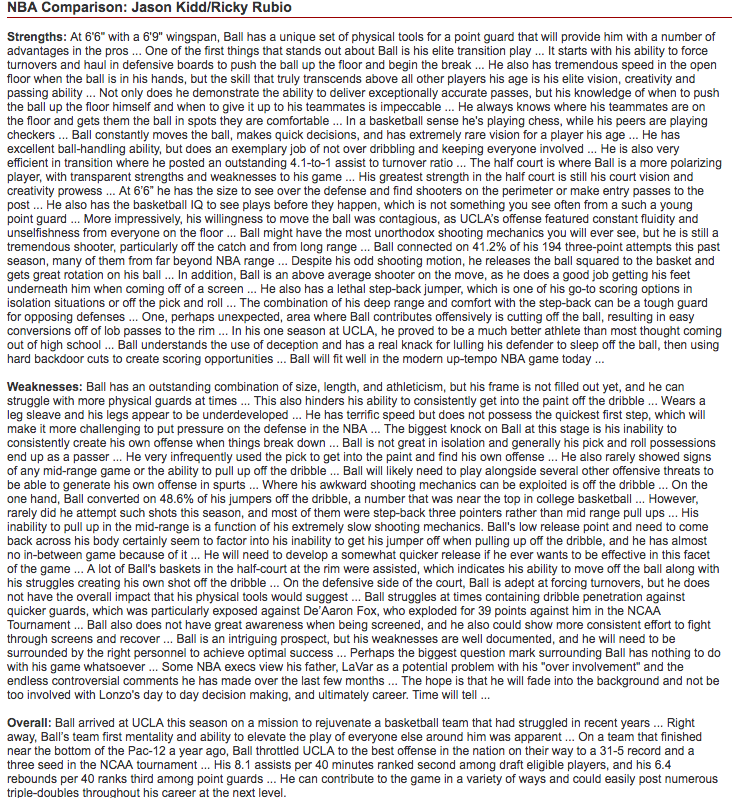
I can't believe it took me this long to read Moneyball by Michael Lewis.
For someone whose life (mostly, at least) revolves around sports analytics, to not read the Holy Bible of it -- and instead only watching the cinematized film version starring Brad Pitt (still awesome) -- was simply a travesty, I now realize. Even for a basketball fan that probably couldn't even recognize half of the MLB's All-Stars this year, Moneyball was enlightening in several ways, and far and away now my favorite book of all time.
But one thing (actually, several) about it really struck me. Much of the emphasis on Billy Beane's new "Moneyball Method" was in part the transition from the subjective to the objective in player evaluation, especially when it comes to prospect scouting. The more conventional baseball scouts would say things like "he's got wheels (fast runner), a nice swing, [etc.]" whereas Paul DePodesta, Billy's right-hand man and computer geek, would say things like "he's got an on-base percentage that cracks 40%," which is apparently -- Lewis argues -- a significantly more important observation. It has since been agreed upon that Rockets GM Daryl Morey has brought Beane's analytical ways into the basketball sphere with what some call "Moreyball" and that now the transition is more or less fully complete.
But is it? Take Lonzo Ball's scouting report from this year, published by what I actually consider an excellent basketball prospect evaluator, nbadraft.net:
For someone whose life (mostly, at least) revolves around sports analytics, to not read the Holy Bible of it -- and instead only watching the cinematized film version starring Brad Pitt (still awesome) -- was simply a travesty, I now realize. Even for a basketball fan that probably couldn't even recognize half of the MLB's All-Stars this year, Moneyball was enlightening in several ways, and far and away now my favorite book of all time.
But one thing (actually, several) about it really struck me. Much of the emphasis on Billy Beane's new "Moneyball Method" was in part the transition from the subjective to the objective in player evaluation, especially when it comes to prospect scouting. The more conventional baseball scouts would say things like "he's got wheels (fast runner), a nice swing, [etc.]" whereas Paul DePodesta, Billy's right-hand man and computer geek, would say things like "he's got an on-base percentage that cracks 40%," which is apparently -- Lewis argues -- a significantly more important observation. It has since been agreed upon that Rockets GM Daryl Morey has brought Beane's analytical ways into the basketball sphere with what some call "Moreyball" and that now the transition is more or less fully complete.
But is it? Take Lonzo Ball's scouting report from this year, published by what I actually consider an excellent basketball prospect evaluator, nbadraft.net:
You don't have to read the whole thing unless you want to, but you get the basic idea if you just glance at a few of the notes. While an incredibly detailed report written by someone who has clearly watched Lonzo play and definitely knows what he's talking about, these are the types of "arbitrary evaluations" that teams use that make Billy Beane throw chairs across rooms (read the book!). But what else can scouting departments do? It seems farfetched that college basketball statistics might actually be an accurate predictor of pro-level stats, for how can you possibly compare someone who plays in the ACC versus something like the Ivy League?
So that's ultimately the question that sparked this research project: are NBA teams, which are reliant on these "subjective" evaluations of prospects, good at selecting players or not? Lucky for those of you whose curiosity I piqued, we have an answer.
(click the link below to continue!)
So that's ultimately the question that sparked this research project: are NBA teams, which are reliant on these "subjective" evaluations of prospects, good at selecting players or not? Lucky for those of you whose curiosity I piqued, we have an answer.
(click the link below to continue!)


 RSS Feed
RSS Feed